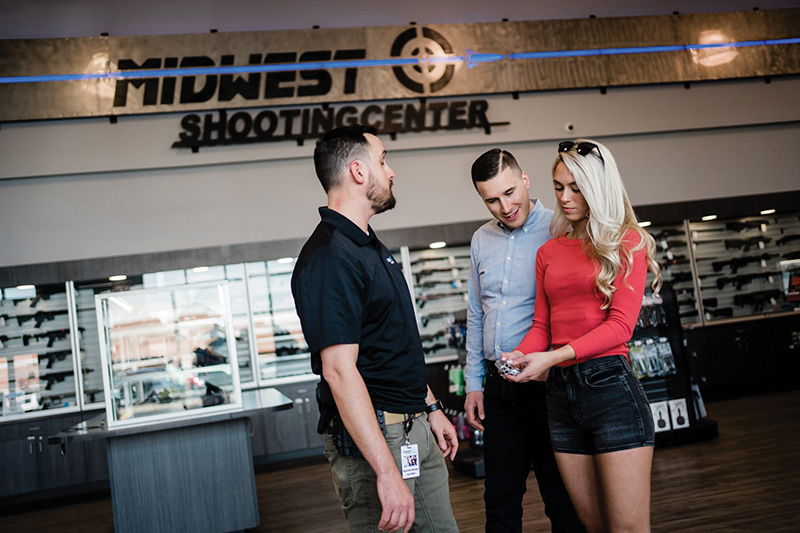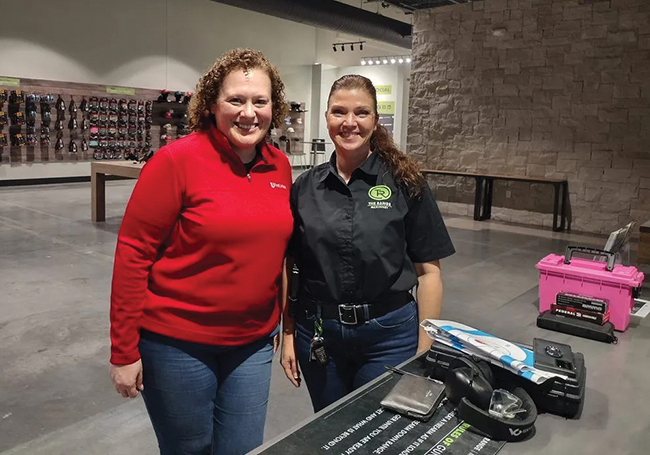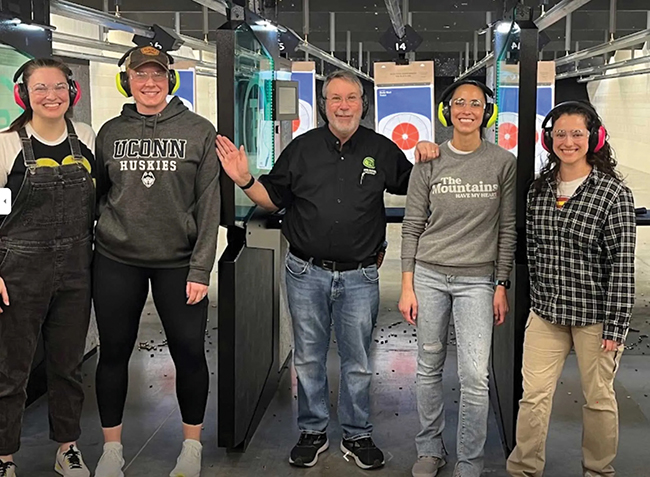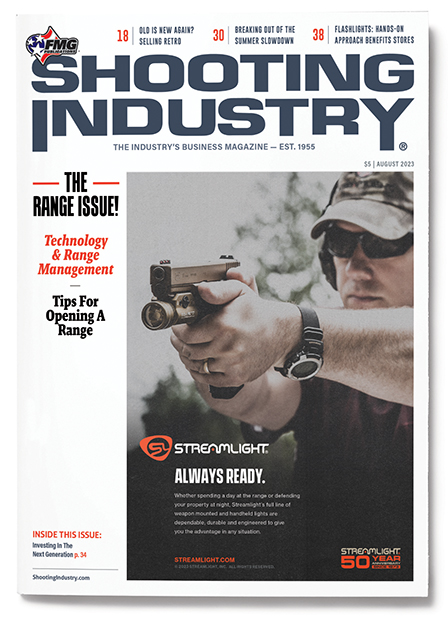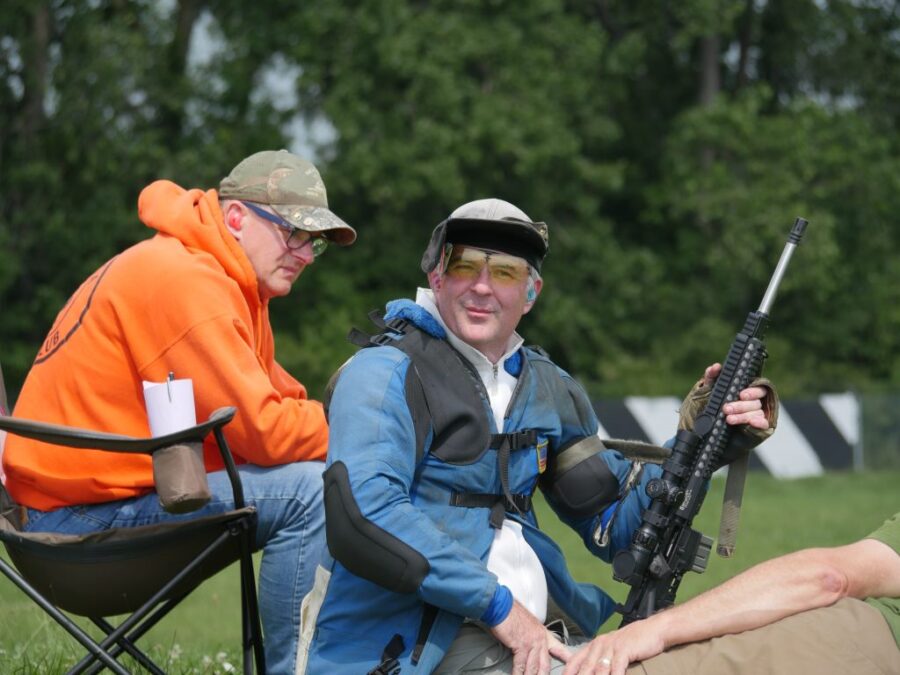Opening A Range?
Here Are Some Do’s & Don’ts
No one builds a new indoor shooting range on a whim. It’s an undertaking that demands an enormous investment in both money and time. If it’s something you’re considering, there are things you can learn from a trio of new range operators who offered to share their experiences.
Origins
For Thom and Julie Beyer, co-founders of The Range In McKinney, Texas, it was an evolution that began nearly a decade ago when they started running a small gun business out of their insurance agency. They spent five years planning and traveling the country, visiting other ranges, attending NRA range development conferences and NSSF meetings.
They wanted their own brick-and-mortar shop — but only if it included a range, which they opened in Nov. 2022.
“It’s like selling someone a car,” Thom suggested. “I also want to sell them the gasoline, the road to race it on and a place to store it.”
Opening Alabama Firearms Academy, in Boaz, Ala., offered a chance for Jared Meeks and his niece’s husband, Devin Campbell, to go into business together. After years of planning, they settled on a location in their hometown, where they renovated a building that was once part of an outlet mall. Meeks has owned a gun store — Jared’s Tactical & Firearms — for more than a dozen years, but he wanted a range. The new shop opened in Dec. 2022.
“I was convinced I was going to do it one way or another, even if it took me five more years by myself,” Meeks said. “But with Devin helping me, it happened a lot faster.”
David Sabo and his partner Jeff Swinford, of Midwest Shooting Center, came to the industry from an entirely different angle, with a background running franchises for an international fitness chain. They joined the firearms industry in 2016 with an e-commerce operation before quickly opening a small retail shop. Then in 2017, they opened their first range in Lima, Ohio. They’ll open their eighth location this summer and are currently working with dozens of prospective franchisees.
“We felt we needed a range to tap into those other revenue sources, such as membership and training,” Sabo explained. “So, we made what we considered our first real investment in the industry.”
“We get so many compliments on how friendly and welcoming we are. Our customer service is excellent and our facilities are nice. And those are exactly the things we wanted.”
Julie Beyer, Co-Founder
The Range • McKinney, Texas
Government Relationships
Before getting serious about a range, you need to assess your chances of getting it approved by local government officials. Having a strong relationship could make or break your dream.
“I’ve actually lived through it,” Meeks stated. “If you don’t have a good relationship with the city, you’re going to be miserable. They’re going to cause you problems and it’s going to cost you a bunch of money.”
Before opening the Boaz range, Meeks tried to expand his original store, located in another city. Things went well initially, with the city offering to donate 15 acres of land for an indoor/outdoor range. But after some locals started complaining, the city’s support evaporated. By the time it was over, Meeks said he’d sunk $50,000 into lost development costs.
Switching to Boaz, Meeks and his partner found a more welcoming community, with support from several other nearby towns — all eager to have a new range close by.
“It has been really eye-opening for us,” he shared. “If we need something, all we have to do is ask and the city will bend over backward to help us.”
One of the challenges is figuring out whether government officials are truly open to your plans, contends Sabo, with Midwest Shooting. You could spend six months working through the bureaucratic process, only to find the person you’re dealing with doesn’t have the ability, or desire, to get it done.
In the end, Sabo asserts that you need the city’s support for your vision: “They can stonewall you all day if they don’t believe in the use.”
While your project may need the approval of local council members, don’t underestimate the importance of city staffers. The Beyers first attempted to build a range in another Texas city but found only modest support. So, they switched to the more enthusiastic city of McKinney.
Yet even with robust support, they ran into a glitch the day before the project was heading to a vote at a planning hearing. They got a phone call letting them know staffers were going to recommend rejecting the project and why. This call gave the Beyers a chance to prepare answers for skeptics who were worried about noise.
“They were giving me a heads-up about what was going on,” Thom said. “They were pointing me in the right direction.”
When it was over, the project passed with a unanimous vote.
Plan For Roadblocks
Undoubtedly, there are going to be obstacles — many of them outside your control — standing between you and your new range.
Supply logistics offered the biggest headache for the Beyers, who were trying to open their range in the aftermath of the COVID pandemic that created global supply chain issues.
It was easy to find inventory to sell, but they couldn’t get everything needed for the building to be ready for occupancy, particularly when it came to the HVAC system. They found the air handling units, but not the computer chips — made in China — needed to control them. This added seven months to the project.
The Beyers also ran into roadblocks when it came to financing until they made a connection with a friendlier Oklahoma-based community bank.
“We were trying to figure out the best way to go and many of the large banks wouldn’t even talk to us,” Thom recalled.
For Sabo and Midwest Shooting, the real estate piece of the puzzle is often the trickiest. The company doesn’t build from the ground up. Instead, they look for vacant retail box stores in areas that fit their business model.
“Once we have it acquired, we’re fairly turnkey because everybody has done this multiple times now,” he remarked.
This experience is one of the reasons the company is seeing so much interest from potential franchisees, Sabo informed. There’s just so much to do when starting from scratch.
“They’re trying to build out their business model, their staffing model, revenue models, their price structures and figuring out their initial store set up. It’s just a huge project when you go through it the first time,” he said.
How To Stand Out
If you’re going to make the investment, you need to give your business the best chance at success. For each of these ranges, it meant building modern facilities that are clean, well-lit, visually appealing and welcoming.
Julie Beyer recalled some of her early visits to gun stores, where she often felt ignored by staffers who were only interested in talking with her husband. She and her husband were determined to avoid this dynamic with their own store.
“We get so many compliments on how friendly and welcoming we are,” she noted. “Our customer service is excellent and our facilities are nice. And those are exactly the things we wanted.”
For marketing, they’ve used radio, a local monthly magazine, a website and emails. In the end, social media has the largest reach. It helps they have an employee experienced with Facebook and other popular platforms.
“Radio can be great, but it’s expensive and you’re only getting one segment of the population,” she mentioned. “Social media is the only way to get everybody covered.”
Meeks, like his counterparts, spent a lot of time visiting other ranges around the country before building the Alabama operation. He came away from those journeys with a lot of ideas about what to do — and what to avoid.
“When you walk into our place, it’s clean and you should be spoken to every time you come in the door,” he said. “I have a little girl and I don’t want her to walk in somewhere and have to use a nasty bathroom.”
With his partner coming from a Walmart background, they’ve employed a modern retail approach, with TVs and electronic billboards throughout the store to market products and services. They have event space, an entertainment area and a beverage room for members.
For marketing, they use billboards, radio, email blasts and social media. Next up, Meeks plans to try a direct-mail campaign. Instead of hiring a pricey marketing firm, they’ll take advantage of a self-service option from the post office that allows them to blanket any individual zip code for $300.
“If you do it yourself, all you have to do is take the flyer down to the post office and they’ll send it out for you,” Meeks shared.
Midwest Shooting focuses on making novice shooters feel comfortable. Stores tend to be run by gun enthusiasts who love the industry and have a passion for firearms, but according to Sabo, it often creates intimidating environments for newcomers.
“We go the complete opposite. We’re 100% tailored to the beginner and to the new shooter,” he expressed. “We go in and try to change the perception our industry has faced over the years.”
Once they get those newbies into the store, there’s a major emphasis on range memberships — with an average of 2,500 members at each location. They follow it up with six- to 12-month training programs, giving customers more reasons to come back.
For marketing, they’ve had the most success with social media, supplemented with modest use of radio and billboards. They’ve managed to avoid entanglements with social media censors by avoiding mentioning specific products.
“You can’t say firearms and you can’t say ammo,” Sabo said. “So, we market the other aspects of the business. We just market the brand personality. It’s more or less awareness, and we can talk about training.”
“We’re 100% tailored to the beginner and to the new shooter. We go in and try to change the perception our industry has faced over the years.”
David Sabo, Patner
Midwest Shooting Center
Lessons Learned
Regardless of how much planning you do, it’s unlikely you’ll make it to the end without running into an unexpected development or two. There will be things you’ll wish you would have known from the beginning.
For Meeks, it was a hard lesson in dealing with contractors. After getting his project started for an agreed-upon price, he remembers walking around the building with the contractor and asking for improvements or changes here and there. What he didn’t realize was the contractor was adding up all of those “change orders” without mentioning the impact on the final price.
His advice: Get everything in writing, signed both by you and your contractor.
“If I had it to do over again, I probably could have saved $200,000 to $300,000,” he reflected.
For Sabo and his partner, who were coming from the world of fitness, it was the cyclical nature of the firearms industry.
“I don’t want to say we didn’t know it, but I don’t think we knew the extent of it,” he admitted.
The wild swings made things less financially predictable than a typical retail experience. They opened their first range during the lackluster years before the pandemic. They quickly learned not to rely too heavily on merchandise sales.
“We got good at selling memberships and training,” he said. “Now, all of our expenses for our locations are covered by memberships and training.”
For the Beyers, it was realizing how much work was involved in getting the back end ready for their opening.
“We picked out a great point-of-sale product, but it was making sure you’ve got the UPC codes in for all of your products, and that you really do have everything in the system,” Thom Beyer acknowledged.
It’s the kind of thing that can get lost in the shuffle when you have 200 different tasks needing to be completed before a grand opening.
“We were up until 2 a.m. the night before, putting things in and making sure it all worked out,” he said.
There’s no denying the amount of hard work needed to get a project of this magnitude off the ground and running. However, the reward of owning and operating a successful range business is, ultimately, a worthy endeavor.
What’s your range story? Email editor@shootingindustry.com for the opportunity to be featured in an upcoming issue!

